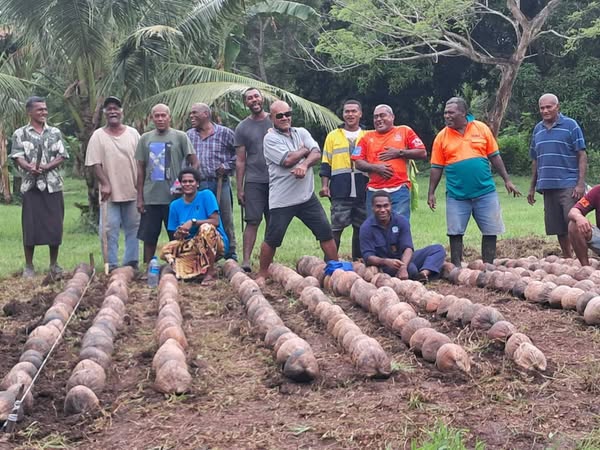REVIVING COCONUT PLANTING IN LOMAIVITI
June 4, 2025

Over the last two months, an extensive coconut training was held in Moturiki and Koro Island by the Ministry of Agriculture and Waterways.
In both islands, the training was attended by forty individuals representing all the villages.
According to Senior Agriculture Officer (Coconut) Sailoama Bati, a significant outcome of the training was the successful establishment of the Moturiki Island Coconut Growers Association.
“The group core objective is to establish coconut nurseries in each village to support replanting and new planting programs. The training facilitated the immediate establishment of the first nursery in Daku Village. The initial plan of one nursery per month was quickly surpassed due to overwhelming community enthusiasm, with nurseries successfully established in Nasesara, Niubasoga, and Wawa villages shortly after the training,” said Ms Bati.
Currently, coconut cultivation on Moturiki primarily serves home consumption and ceremonial purposes, with limited commercial activity.
A few farmers supply coconuts to the municipal market at $10 per dozen and to the Agricultural Marketing Authority (AMA) at $0.40 per nut.
The training team consisting of Research Officer (Tree Crops) Semisi Tuikilakila, Senior Technical Assistant (Tree Crops) Jone Livani and Ms Bati with the enthusiastic support of the participants, successfully delivered all lectures and hands-on practical sessions, ensuring a comprehensive and impactful learning experience.
Beyond raw coconut sales, the training also highlighted opportunities for income diversification through value-added products.
This rapid expansion of nurseries and the eagerness for value-added processing demonstrate a powerful revival in coconut cultivation on Moturiki. Villagers are highly motivated to revive this traditional income source, believing a thriving and diversified coconut industry will ensure sustainable income and enhanced community resilience.
Meanwhile, Koro Island has also seen a renewed focus on coconut cultivation through the week-long training program, with the first phase successfully conducted for the Cawa District.
Twenty individuals from four Cawa villages participated, leading to the establishment of the Koro Island Coconut Growers Association.
Similar to Moturiki, the association aims to establish coconut nurseries in each village. The first nursery was successfully set up in Nabuna Village during the training, with the second planned for Vatulele Village on June 6, 2025.
The training deeply resonated with participants, including 80-year-old Jone Guguca, Turaga Na Tui Nabuna, who emotionally recounted how coconut cultivation was once the primary source of income for Koro Island, supporting community infrastructure and education.
Since the introduction of new crops like dalo and yaqona, coupled with the devastation caused by Tropical Cyclone Winston in 2016, the people of Koro have diversified their farming, often neglecting coconut cultivation. This has resulted in a significant decline in coconut planting since 2016 in most Koro Island villages.
He expressed deep gratitude for the ministry's initiative to revive coconut cultivation on Koro Island for its people.
He expressed gratitude for the ministry's initiative to revive coconut cultivation, especially for the younger generation, given the challenges faced with other crops like dalo and yaqona.
Mr. Guguca emphasized the enduring value of coconuts, stating that if coconut trees are planted now their children and future generations will know its benefits.
“One day, we will return to this crop, the coconut. Let us start planting coconuts again for our future generations,” stressed Mr. Guguca.
Participants learned about the potential of utilizing unutilized coconuts and creating value-added products.
This has led to proactive requests for whole-nut processing training for Koro's women and youth, specifically to meet the supply needs of the upcoming 7-star Koro Island Resort.
This renewed interest in nursery establishment and value-added processing signals a powerful revival of coconut cultivation on Koro and Moturiki Island.
Villagers are highly motivated to restore what was once their main income source, believing a thriving and diversified coconut industry will lead to sustainable income and enhanced community resilience.
ENDS
